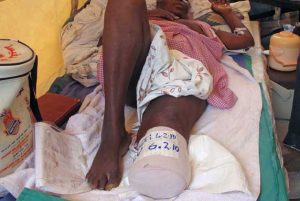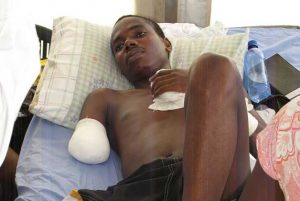PROSTHETICS MINISTRY
The Devastating Impact of Amputation
According to the Journal of Orthopedic Surgery and Research (JOSR), amputation is one of the oldest surgical procedures, dating back more than 2,500 years. The reasons for amputation have changed over time. In the United States, those suffering from vascular disease most commonly require amputation. However, in the developing world, land mine injuries, motor vehicle and factory accidents and natural disasters such as earthquakes and tsunamis claim the limbs and livelihood of survivors.The World Health Organization estimates that there are 40 million amputees throughout the developing world, but only about 5% of them have access to any form of prosthetic devices or assistance.
Unfortunately, in many of the cases where assistance is available, amputees do not have the resources to pay for the help that they desperately need. This disparity between the need and available solutions, leave millions of amputees without hope of ever regaining their mobility, independence, and dignity.
In developing countries—where two feet are often the only means of transportation—the loss of a leg is just the first step in a cycle of loss that includes the loss of jobs, friends, family, independence, dignity and hope. Amputees are ostracized from their communities and forced onto the streets where they have to beg in order to survive.
The Prosthetics Ministry of Operation Go Quickly
Operation Go Quickly has developed a prosthetics outreach in conjunction with the amputee soccer program. We have provided prosthetic limbs for approximately 20 of the Haitian national team members since 2014. With supplies and equipment donated by private American prosthetics providers, and expertise and labor provided by volunteer prosthetists, we are able to fabricate prosthetic legs at a fraction of the usual cost.
Our prosthetics outreach is not limited to soccer team members. In March 2017, and again in May 2017, our prosthetics team travelled to Haiti to provide services to several citizens not involved with the team. We visited Port Au Prince in March, where we built legs for Joubens Jean, an eight-year-old boy, and his mother Rosemene Jean, who had both suffered amputations following an automobile accident several years ago. We also fabricated a prosthesis for Alide, a 19-yer old cancer victim. A number of other patients were treated as well. During that visit, we established a working relationship with the administration and clinical staff at the Healing Hands of Haiti Orthotics and Prosthetics Clinic.
In July, we visited Cap Haitian and fabricated prostheses for five new patients. On this visit we were welcomed by the administration of the Milot Rehabilitation Hospital. We were permitted the use of their fabrication facilities and were assisted by the local staff. This prosthetics laboratory had not been in use for the past year due to lack of funding, but with our donation of a few hundred dollars worth of supplies, five area residents are now walking independently! We also discussed arrangements for future support of the Milot Prosthetics Clinic.
Our goal is to continue to develop and maintain working relationships with in-country prosthetics providers in order to serve those amputees who otherwise have no access to prosthetic treatment. We will continue to provide material support, as well as coordinating visits by American prosthetists who wish to lend their expertise. With the prayers and financial support of our partners here, OGC hopes to change the lives of many more amputees in Haiti and beyond.
To sustain and expand the prosthetics ministry Operation Go Quickly actively seeks donations of new and used prosthetic hardware. Prosthetists and others interested in prosthetics are urged to volunteer their time and services so that more amputee may be helped in more countries. Prosthetist Tim Goldberg heads up the Operation Go Quickly prosthetics ministry. He may be contacted at tim@goquickly.org.


